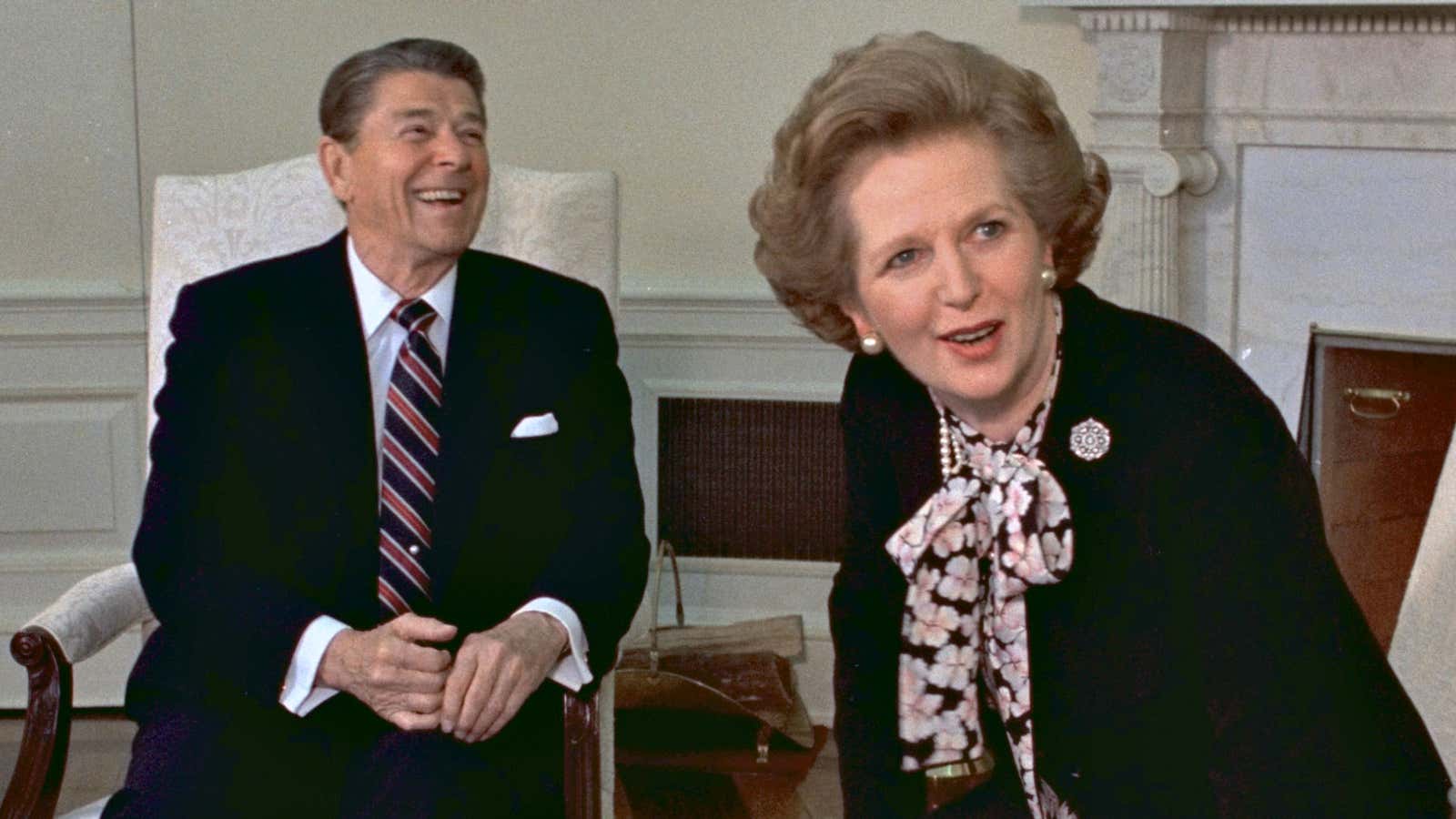British prime minister Theresa May is in Washington today to meet US president Donald Trump, and trade is high on the agenda. In the first state visit by a foreign leader to Trump’s White House, May wants to put Britain at the “front of the queue” for a free-trade deal with America. Trump said his administration will work to get a deal “done quickly and done properly.”
There will be a lot of talk about the so-called “special relationship” between the US and UK, which flourished when conservative soulmates Ronald Reagan and Margaret Thatcher were running Washington and Westminster. Trump has reportedly referred to May as “my Maggie,” harkening back to that close relationship.
But Trump is not Reagan, May is not Thatcher, and Anglo-American policies today bear little resemblance to those that prevailed in the freewheeling 1980s. At his inauguration, Trump promised an “America First” trade policy. Meanwhile, May has pledged to put “UK interests and UK values first.” A deal is far from assured (paywall), and even if the relationship between the two countries remains special, it is also lopsided.
The UK is quitting the European Union, which will require renegotiating all of the trade relationships it maintained as a member of the bloc, as well as establishing new ones to soften the blow from a potential “hard Brexit” that cuts off favorable access to its main European trading parters. For this reason, the UK needs a trade deal more than US, both for the sake of its economy and the political fortunes of its post-Brexit prime minister.
British exports to the US comprise around 15% of the UK’s total exports, according to data from the International Trade Centre. The US exports less than 4% of its goods to the UK:
The UK also imports 9% of its goods from the US, while the US takes in just 4% of all its imports from the UK:
Although the relative importance of US-UK trade in goods may favor one side, the countries still have an interest in forging a trade deal, since both are actively distancing themselves from larger, neighboring trading partners. A deal would dispel doubts that Trump’s “America First” stance entails total isolation as well as promote May’s claim that Brexit frees her hand “to build a truly Global Britain.”
Trade in services will be a crucial aspect of the negotiations, since both countries’ economies rely more heavily on services than manufacturing. The British economy is 80% services; in 2013, it had a £81 billion trade surplus in services. The UK imports 19% of its total foreign services from the US, and exports 24% of its services to the US.
Services face complicated non-tariff barriers when traded across borders, and are notoriously difficult to negotiate in trade agreements. That the world’s two rival financial centers are in New York and London will make this a particularly thorny issue.
So let’s focus on goods, which may be an easier area for the two sides to find agreement. These are the top export categories from each country to the other:
Until it formally quits the EU, probably in 2019, the UK’s trade with the US is determined by EU rules. “The United States and the 28 member states of the EU share the largest and most complex economic relationship in the world,” according to the latest trade estimate report (pdf) by the US Trade Representative (USTR).
Brexit presents an opportunity for the US to access British markets without the restrictions currently imposed by the EU. These are some of the barriers to trade with the EU that the USTR has highlighted:
- The EU’s rules on truck lengths are too prescriptive and restrict export of “aerodynamic and fuel efficient trucks” to Europe
- Whiskey (or whisky) must be aged for at least three years to be sold with the name in the EU. The US says new technology means this isn’t necessary, but try telling that to Scottish traditionalists
- The EU bans meat and animal products produced using hormones, as well as certain biotech crops
- The EU bans the sale of chicken washed with chlorine
- The UK government’s special support to Rolls-Royce puts American engine-makers at a disadvantage
- The UK’s national health service restricts access for drug companies. In December, US pharma group Pfizer was fined more than $100 million for boosting the price of a drug sold to the NHS by 2,600%
Removing these restrictions would be good for US exporters but possibly at the expense of British firms. If May relented on EU-inspired standards, particularly relating to agriculture, farmers would need to adhere to two sets of rules to sell to both the US and EU. On top of all this, after 40 years of EU membership, the UK doesn’t have many trade negotiators of its own, since this function was taken care of by Brussels on behalf of member states. (The government now has a six-month-old department for international trade.)
The fundamental hurdles to a deal that the visiting British prime minister can trumpet back home, though, will be overcoming Trump’s protectionist tendencies and zero-sum approach to trade negotiations. As Thatcher once said, “You may have to fight a battle more than once to win it.”
